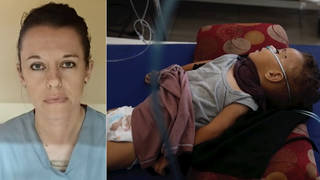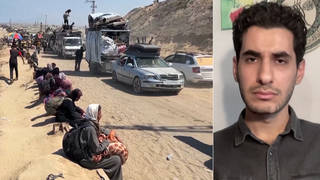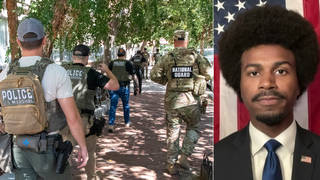
Guests
- Henri AllegFrench journalist who supported Algerian independence from France. He was arrested by French paratroopers in Algeria and interrogated and subjected to waterboarding.
Three crucial members of the Senate Judiciary Committee said this weekend they would back the nomination of attorney general hopeful Michael Mukasey despite his refusal to condemn waterboarding as a form of torture. Henri Alleg, an 86-year-old journalist subjected to waterboarding by French troops during the war for Algerian independence, says no civilized country should allow it. [includes rush transcript]
We now turn to a real-life survivor of the Algerian war of independence. Henri Alleg is a French journalist who was arrested by French paratroopers in Algeria in 1957. Alleg was sympathetic to Algerian independence. He was interrogated for a month, questioned under torture, and repeatedly subjected to waterboarding.
Alleg described his ordeal in an essay titled “The Question,” which was published in 1958 with a preface by Jean-Paul Sartre. The book was subsequently banned in France and legalized only after the war ended in 1962. Henri Alleg, 86-year-old survivor of torture by French paratroopers, joins me now on the phone from Paris, France.
- Henri Alleg. French journalist who supported Algerian independence from France. He was arrested by French paratroopers in Algeria and interrogated and subjected to waterboarding.
Transcript
AMY GOODMAN: We turn now to another issue, to the issue of Judge Mukasey becoming the attorney general of the United States. Three crucial members of the Senate Judiciary Committee said this weekend they would back the nomination of attorney general hopeful Michael Mukasey, despite his refusal to condemn waterboarding as a form of torture. Just days ahead of Tuesday’s committee vote, Pennsylvania Republican Senator Arlen Specter joined Democratic Senators Charles Schumer of New York and Dianne Feinstein of California in supporting Mukasey’s nomination.
Mukasey’s confirmation had been in doubt, as five of the panel’s 10 Democrats had lined up against him after he refused to state categorically that waterboarding is illegal. But Schumer and Feinstein’s support now virtually guarantees that a majority of the committee will recommend his confirmation.
Waterboarding is the practice of pouring water over the cloth-covered face of a prisoner while they’re strapped down to induce the sensation of drowning. It’s been used by some of the world’s most repressive regimes, from the Khmer Rouge in Cambodia to the military dictatorships of Chile and Argentina. The French used waterboarding in Algeria in the 1950s and ’60s.
Today we’ll be joined by a French journalist who was tortured by French forces in Algeria. But first, we’re going to go to a clip of the film The Battle of Algiers. It was released in 1966 by the Italian filmmaker Gillo Pontecorvo. The film vividly depicts the Algerian struggle for independence against the French occupation in the ’50s and ’60s. French paratroopers sent to root out the Algerian National Liberation Front are shown employing torture, intimidation and murder to defeat the resistance. This is an excerpt of that film, The Battle of Algiers, with the colonel from the French paratroopers holding a news conference with reporters.
REPORTER: Colonel Mathieu, the spokesman of the resident minister, Gorlin, states that Ben M’Hidi hung himself in his cell, tearing up his shirt to make a rope which he tied to the bars of the window. In an earlier statement that same spokesman said that because the prisoner said he would escape on the first possible occasion, it was thought advisable to keep him permanently bound hand and foot. According to you, Colonel, is a man in this condition capable of ripping up a shirt, making a rope and tying it to the window bars?
COLONEL MATHIEU: You should ask the spokesman about that. I didn’t make the statements. From my part, I appreciated Ben M’Hidi’s moral strength, intelligence and the way he stuck to his ideals. And so, even though I recognize that he was dangerous, I pay homage to his memory.
REPORTER: Colonel, there’s been talk recently of the para’s successes and of the methods they said to use. Could you say something on this?
COLONEL MATHIEU: The successes result from these methods. The one presupposes the other.
REPORTER: I feel that being excessively careful, my colleagues keep asking roundabout questions to which you can only reply in a roundabout way. It would be better to call a spade a spade. If it’s torture, let’s speak of torture.
COLONEL MATHIEU: I understand. You have no questions?
REPORTER: The questions have been asked. We would like the answers.
COLONEL MATHIEU: Let us be exact. The word “torture” does not appear in our orders. We ask questions as in any police operation against an unknown gang. The FLN asks its members to keep silent for 24 hours if they are captured. Then they can talk. That’s the time required to render any information useless. How should we question suspects? Like the courts and take a few months over it? The legal way has its drawbacks. Is it legal to blow up public places? When he asked Ben M’Hidi, what did he say?
Believe me, it’s a vicious circle. We could talk for hours without reaching a conclusion. The problem is quite different. The FLN wants to kick us out of Algeria. And we want to stay. Even though we have different ideas, I think we all want to stay. When the rebellion started, there were no nuances. All the papers, even those of the left, wanted it suffocated. We’re here for that. We are neither mad nor sadists. They call us fascists. They forget what we did in the Resistance. They say Nazis, but some of us survived Buchenwald. We are soldiers. Our duty is to win; thus, to be quite clear, I’ll ask you a question myself: Must France stay in Algeria? If the answer is still “yes,” you must accept all that this entails.
AMY GOODMAN: The French colonel being questioned by the press in the 1966 film The Battle of Algiers.
We now turn to a real-life survivor of torture of the Algerian war. Henri Alleg is a French journalist who was arrested by French paratroopers in Algeria in ’57. Alleg was sympathetic to Algerian independence. He was interrogated for a month. He was questioned. He was waterboarded repeatedly. Alleg described his ordeal in an essay called “The Question,” which was published in 1958 with a preface by Jean-Paul Sartre. The book was subsequently banned in France and legalized only after the Algerian war ended in 1962. Henri Alleg is 86 years old now, survived torture by French paratroopers, lives now in Paris and joins us on the phone.
Welcome to Democracy Now!, Henri Alleg.
HENRI ALLEG: Hello.
AMY GOODMAN: It is good to have you with us.
HENRI ALLEG: Thank you. Can you make it a little louder?
AMY GOODMAN: Can you hear me now?
HENRI ALLEG: Yes, thank you.
AMY GOODMAN: Can you describe — as you hear the debate in the United States around whether waterboarding is torture, specifically tell us about your experience of waterboarding. Where were you being held, and what exactly did the French military do to you?
HENRI ALLEG: Well, I have described the waterboarding I was submitted to. And no one can say, having passed through it, that this was not torture, especially when he has endured other types of torture — burning, electricity and beating, and so on. So I am really astonished that this is a big question in the States about this, because the real question is not waterboarding or not waterboarding, it’s the use of torture in such a war, and this use of torture, torture in general.
A man liked General Massu, who was the chief organizer of torture in Algeria and who died about two years ago, asked about three months before his death what he thought of torture and the use of — the general use of torture in Algeria, said that he regretted it and that the war could have been — could have gone on without torture. In fact, torture is not the main thing in such a war. The war was against the Algerian people, and every kind of torture used against an Algerian man or woman would only help the Algerians to fight back, and that when a son knew that his father was tortured, he had only one idea, that is, join the fighters who had tortured his father. So, I don’t think this is the good question.
But to answer precisely your question, it is a terrible way of torturing a man, because you’re bringing — you bring him next to death and then back to life. And sometimes he doesn’t come back to life. So, the use of torture, in my opinion, is a way of making all people fear that if they fight, if they join the fighters against Algeria, they would undergo such a treatment. So it’s the use of terror against the people who fight. It’s not a way of getting whatever information; sometimes they get it, but most of the time it’s useless. So it is not a way of winning a war, even if the people who lead this war say that they have — it’s an obligation for them to use this method if they want victory at the end of the war. That’s my opinion.
AMY GOODMAN: Henri Alleg, I realize it was, what, about a half a century ago that you were held, interrogated and tortured. But I was wondering, since obviously I think most people, most in the civilian population, even soldiers, are not really familiar with what exactly waterboarding is. It has become almost a kind of catchphrase. Can you explain exactly what happened to you?
HENRI ALLEG: Well, I was put on a plank, on a board, fastened to it and taken to a tap. And my face was covered with a rag. Very quickly, the rag was completely full of water. And, of course, you have the impression of being drowned. And —
AMY GOODMAN: The “tap,” meaning you were put under a water faucet?
HENRI ALLEG: A tap, yes, tap water. So, very quickly, the water ran all over my face. I couldn’t, of course, breathe. And after a few minutes, fighting against the impression of getting drowned, you can’t resist. And you feel as if you were drowning yourself. And this is a terrible impression of coming very near death. And so, when the paratroopers, the torturers, see that you’re drowning, they would stop, let you breathe, and try again. So that impression of getting near to death, every time they helped you to come back to life by breathing, it’s a terrible, terrible impression of torture and of death, being near death. So, that was my impression. But it’s difficult to say that this —
AMY GOODMAN: In the context — explain the context for us, Henri Alleg, as they held you under the faucet and the water filled your lungs, what did the French military — what were they demanding of you, and how did you stop it? How did it start again?
HENRI ALLEG: They just wanted me to, first of all, say what I was doing in the moments I was illegal, because I stopped, of course, going to the newspaper, because it was suppressed. So I had to hide, because I knew that I would be taken and sent to a concentration camp. So they wanted to know who were the people I met during that illegal period, what was the people that I had met and what they were doing. That’s what they wanted from me —
AMY GOODMAN: Did you tell them?
HENRI ALLEG: — is to denounce my friends, and I refused to open my mouth to say a word about that. I wouldn’t betray my friends. They didn’t know much more about me. And that is what they wanted. And I didn’t want to help them in any way that would be possible.
AMY GOODMAN: When the water came into your lungs, how did you remain conscious? How did you resist it?
HENRI ALLEG: Well, they said to me, “When you want to talk, you just move your fingers.” Move your fingers. Of course, I was strapped to a board. And the first time I — they started that, I didn’t realize even that I was moving desperately my fingers. So I moved my fingers, and they shouted around me, “So he’s going to talk! He’s going to talk!” So they let me breathe. And as soon as I got a little breath again, I denounced it, and I still refused. So they started again. They said, “He’s making a joke out of us.” So they gave me very heavy blows on my chest and on my belly to make the — get out the water of my lungs and of my body. And they started again afterwards.
And suddenly, as I have explained it — I think it was the third time — I just fainted. And I heard them after a while saying, “Oh, he’s coming back. He’s coming back.” They didn’t want me to die at once, and I knew afterwards, a long time afterwards, that many of the people who went under that waterboarding, as you call it, after having had some moments of fainting, some of them would die, drowned, ”asphyxier,” as we say in French. It’s completely — it’s impossible to breathe, so they die, as if they were drowned, and this kind of “accident,” as they call, was very frequent.
AMY GOODMAN: Did you, Henri Alleg, have the sensation of dying?
HENRI ALLEG: Pardon?
AMY GOODMAN: Did you feel the sensation of dying?
HENRI ALLEG: Yes, and that’s a terrible sensation.
AMY GOODMAN: What did you feel?
HENRI ALLEG: Well, You feel that you’re going to die. Of course, you don’t want to die, and in the same time you don’t want to accept the conditions that they make around you to let you live. So, finally, at this third time, before I fainted, I was really decided to die and not to answer at any cost.
But once again, I’m really surprised that this is the big question put before the American opinion now and not another question: Is such a war a war that can be accepted with such — in such conditions and with such tools? Is it a civilized country that can use such things? And is the fact that this way of fighting — as some military say, it can’t be otherwise — is it acceptable? I think it is not acceptable, especially that the way to legalize such a way of fighting, some military say, we cannot do otherwise. It has no meaning at all. The people who lead a fight for freedom and liberty, even if some of them accept the conditions of the people who torture them, they help hundreds and thousands of other people to join the fight, because it appears to them as something that cannot be accepted by any man who thinks that his fight is honorable and justified.
AMY GOODMAN: Finally, Henri Alleg, the attorney general nominee who will be voted on — his confirmation will be voted on this week — has said if waterboarding is torture, then it is illegal. What is your response to that?
HENRI ALLEG: Of course, I think that all tortures are illegal, and it is unacceptable for a civilized country today.
If you permit, I may make a comparison between what the French did in Algeria and what the Americans are doing now in Iraq. There is a difference. The French government and the French military refused, until the end of the war and a long time after, tens of years after, to accept the idea that it was true that the military in Algeria used torture. They always said that it was not true, that it was propaganda, either nationalist or communist propaganda, but that the French, who had had such a long history of fighting for humanity, for the rights of man, and that the French army, who was the army of such a republic, they could not do such a thing. And they refused to accept the idea and the testimonies, that were very, very numerous, of torture in Algeria. Even if the people didn’t believe their denials — I mean, the government’s denials —- they still maintained that position, until some officers had denied another way of answering. They said that, yes, we did it, but we couldn’t do otherwise. But they only did it when there was an amnesty for all that had been done during the war. So, that was the French position until the end, until now. But in the same time, I think that the American officials had another way of looking at the thing. They didn’t say it was not true, even we saw on television and other means -—
AMY GOODMAN: Henri Alleg, we just have 15 seconds.
HENRI ALLEG: Pardon?
AMY GOODMAN: We just have 15 seconds to go.
HENRI ALLEG: Can I —
AMY GOODMAN: We just have a little bit of time to go, just 15 seconds.
HENRI ALLEG: In only a few seconds. So what I said is that the American stand was to say, yes, we accept it, they have been tortured. Well, some, a few very low-ranking soldiers were sentenced. But after all, they said that now we have laws. We have laws for torture. And waterboarding, for example, which will be accepted as a way of interrogation, is not torture. So, in a way, it’s sort of a hypocritical way of settling things. We are using torture, but we have laws for using it.
AMY GOODMAN: Henri Alleg, we’re going to have to leave it there, but I thank you very much for being with us, French journalist, now 86 years old, living on Paris, France, who was tortured, who was waterboarded by the French military in Algeria in 1957.












Media Options